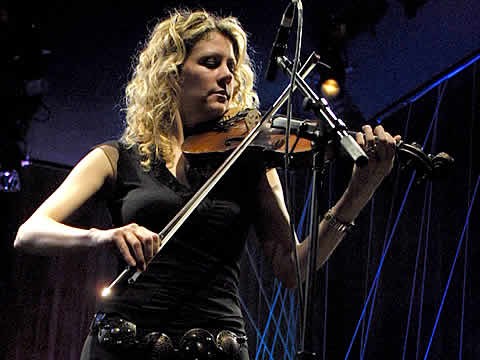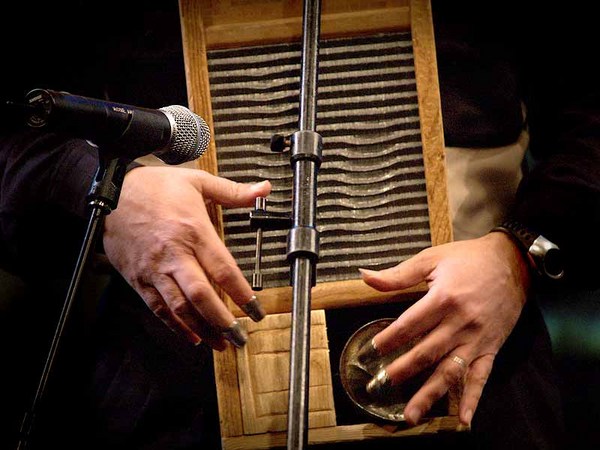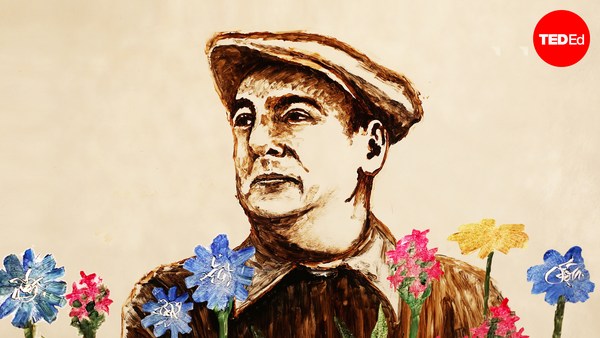(Music)
♫ My age is three hundred ♫
♫ and seventy-two ♫
♫ I think with the deepest regret ♫
♫ How I used to pick up
and voraciously chew ♫
♫ the dear little boys
that I met ♫
♫ I've eaten them raw
in their holiday suits, ♫
♫ Eaten them
curried with rice, ♫
♫ I've eaten them baked
in their jackets and boots, ♫
♫ And found them exceedingly nice. ♫
♫ But now that my jaws
are too weak for such fare, ♫
♫ I think it's increasingly rude ♫
♫ To do such a thing
when I'm quite well aware ♫
♫ Little boys do not like
being chewed. ♫
♫ Little boys do not like
being chewed. ♫
(Music)
♫ So now I contentedly live upon eels, ♫
♫ And try to do nothing amiss ♫
♫ And pass all the time
I can spare from my meals ♫
♫ In innocent slumber like this, ♫
♫ Innocent slumber
like this. ♫
(Applause)
I suppose I owe you an explanation. I've been working on a project for the last six years adapting children's poetry to music. And that's a poem by Charles Edward Carryl, who was a stockbroker in New York City for 45 years, but in the evenings, he wrote nonsense for his children. And this book was one of the most famous books in America for about 35 years. "The Sleepy Giant," which is the song that I just sang, is one of his poems. Now, we're going to do other poems for you, and here's a preview of some of the poets. This is Rachel Field, Robert Graves -- a very young Robert Graves -- Christina Rossetti. Ghosts, right? Have nothing to say to us, obsolete, gone -- not so. What I really enjoyed about this project is reviving these people's words. Taking them off the dead, flat pages. Bringing them to life, bringing them to light. So, what we're going to do next is a poem that was written by Nathalia Crane. Nathalia Crane was a little girl from Brooklyn. When she was 10 years old in 1927, she published her first book of poems called "The Janitor's Boy." Here she is. And here's her poem.
(Music)
♫ Oh, I'm in love
with the janitor's boy, ♫
♫ And the janitor's boy
is in love with me. ♫
♫ Oh, I'm in love
with the janitor's boy, ♫
♫ And the janitor's boy
is in love with me. ♫
♫ He's going to hunt for a desert isle ♫
♫ In our geography. ♫
♫ A desert isle
with spicy trees ♫
♫ Somewhere in Sheepshead Bay; ♫
♫ A right nice place,
just fit for two ♫
♫ Where we can live always. ♫
♫ Oh, I'm in love
with the janitor's boy, ♫
♫ And the janitor's boy, ♫
he's busy as can be; ♫
♫ Down in the cellar he's making a raft ♫
♫ Out of an old settee. ♫
♫ He'll carry me off,
I know that he will, ♫
♫ For his hair is exceedingly red; ♫
♫ And the only thing
that occurs to me ♫
♫ Is to dutifully shiver in bed. ♫
♫ And on the day that we sail,
I will leave a little note ♫
♫ For my parents I hate to annoy: ♫
♫ "I have flown to an island
in the bay ♫
♫ With my janitor's
red haired-boy." ♫
♫ The janitor's red-haired boy ♫
♫ The janitor's red-haired boy ♫
♫ The janitor's red-haired boy ♫
♫ The janitor's red-haired boy ♫
♫ I'm going to sail away ♫
♫ Gone to Sheepshead Bay ♫
♫ With my janitor's red-haired boy. ♫
♫ On an old settee ♫
♫ My red-haired boy and me ♫
♫ The janitor's red-haired boy. ♫
♫ The janitor's red-haired boy ♫
♫ The janitor's red-haired boy ♫
♫ The janitor's red-haired boy ♫
♫ The janitor's red-haired boy ♫
(Applause)
The next poem is by E.E. Cummings, "Maggie and Milly and Molly and May."
(Music)
♫ Maggie and Milly,
Molly and May ♫
♫ They went down to the beach
one day to play ♫
♫ And Maggie discovered
a shell that sang ♫
♫ So sweetly she couldn't remember
her troubles ♫
♫ Maggie and Milly,
Molly and May ♫
♫ Maggie and Milly,
Molly and May ♫
♫ Milly befriended
a stranded star ♫
♫ Whose rays,
whose rays ♫
♫ Five languid fingers
were ♫
(Music)
♫ Maggie and Milly,
Molly and May ♫
♫ Maggie and Milly,
Molly and May ♫
(Music)
♫ Molly was chased
by a horrible thing ♫
♫ Which raced
sideways blowing ♫
♫ Blowing ♫
♫ Blowing ♫
♫ May came home
with a smooth, round stone ♫
♫ Small as a world
and as large as alone ♫
(Music)
♫ For whatever we lose
like a you or a me ♫
♫ Always ourselves
that we find
at the sea ♫
(Applause)
Thank you.
(Applause)
The next poem is "If No One Ever Marries Me." It was written by Laurence Alma-Tadema. She was the daughter of a very, very famous Dutch painter who had made his fame in England. He went there after the death of his wife of smallpox and brought his two young children. One was his daughter, Laurence. She wrote this poem when she was 18 years old in 1888, and I look at it as kind of a very sweet feminist manifesto tinged with a little bit of defiance and a little bit of resignation and regret.
(Music)
♫ Well, if no one ever marries me ♫
♫ And I don't see why they should, ♫
♫ Nurse says I'm not pretty, ♫
♫ And you know I'm seldom good,
seldom good -- ♫
♫ Well, if no one ever marries me ♫
♫ I shan't mind very much; ♫
♫ Buy a squirrel in a cage ♫
♫ And a little rabbit-hutch. ♫
♫ If no one marries me ♫
♫ If no one marries me ♫
♫ If no one marries me ♫
♫ If no one marries me ♫
♫ If no one marries me ♫
♫ I'll have a cottage near a wood ♫
♫ And a pony all my own ♫
♫ A little lamb quite clean and tame ♫
♫ That I can take to town. ♫
♫ And when I'm really getting old -- ♫
♫ And 28 or nine -- ♫
♫ Buy myself a little orphan girl ♫
♫ And bring her up as mine. ♫
♫ If no one marries me ♫
♫ If no one marries me ♫
♫ If no one marries me ♫
♫ If no one marries me ♫
♫ Well, if no one marries me ♫
♫ Marries me ♫
♫ Well, if no one marries me ♫
♫ Marries me ♫
♫ Well, if no one marries me ♫ Thank you.
(Applause) Thank you.
I became very curious about the poets after spending six years with them, and started to research their lives, and then decided to write a book about it. And the burning question about Alma-Tadema was: Did she marry? And the answer was no, which I found in the London Times archive. She died alone in 1940 in the company of her books and her dear friends. Gerard Manley Hopkins, a saintly man. He became a Jesuit. He converted from his Anglican faith. He was moved to by the Tractarian Movement, the Oxford Movement, otherwise known as -- and he became a Jesuit priest. He burned all his poetry at the age of 24 and then did not write another poem for at least seven years because he couldn't rectify the life of a poet with the life of a priest. He died typhoid fever at the age of 44, I believe, 43 or 44. At the time, he was teaching classics at Trinity College in Dublin. A few years before he died, after he had resumed writing poetry, but in secret, he confessed to a friend in a letter that I found when I was doing my research: "I've written a verse. It is to explain death to a child, and it deserves a piece of plain-song music." And my blood froze when I read that because I had written the plain-song music 130 years after he'd written the letter. And the poem is called, "Spring and Fall."
♫ Margaret,
are you grieving ♫
♫ Over Goldengrove
unleaving, by and by? ♫
♫ Leaves, like the things
of man, you ♫
♫ With your fresh thoughts care for,
can you? ♫
♫ But as the heart grows older ♫
♫ It will come to such sights
much colder ♫
♫ By and by,
nor spare a sigh ♫
♫ Though worlds of
wanwood leafmeal lie; ♫
♫ And yet you will weep
and you'll know why. ♫
♫ No matter child, the name: ♫
♫ Sorrow's springs are all the same ♫
♫ They're all the same. ♫
♫ Nor mouth had
nor no mind expressed ♫
♫ What heart heard of,
ghost had guessed: ♫
♫ It's the blight
man was born for, ♫
♫ It is Margaret
that you mourn for ♫
Thank you so much.
(Applause)
(Music)
I'd like to thank everybody, all the scientists, the philosophers, the architects, the inventors, the biologists, the botanists, the artists ... everyone that blew my mind this week. Thank you. (Applause)
♫ Oh, a li la li la la la ♫
♫ La li la la li la la la la la la ♫ (Applause)
♫ La li la la la ♫
♫ La li la la la la ♫
♫ La li la la la la la la ♫
♫ La la la li la la la la la ♫
♫ You've been so kind and
generous ♫
♫ I don't know how you keep on giving. ♫
♫ And for your kindness,
I'm in debt to you. ♫
♫ And for your selflessness,
my admiration. ♫
♫ And for everything you've done,
you know I'm bound; ♫
♫ I'm bound to thank for it ♫
♫ La li la li la la la ♫
♫ La li la la li la li la la la ♫ (Clapping)
♫ La li la la la ♫
♫ La li la la la la ♫
♫ La li la li la la la ♫
♫ La li la la li la li la la ♫
♫ And you ♫
♫ Now you've been so kind and ... ♫
Curb the enthusiasm, just a little bit. Just bring it down a little. (Laughter) It's my turn. I still have two minutes. (Laughter) Okay, we're going to start that verse again.
♫ Well, you've been so ... ♫
That's innovative, don't you think? Calming the audience down; I'm supposed to be whipping you into a frenzy, and I,
"That's enough. Sh." (Laughter)
♫ Now, you've been kind and ... ♫
I'm going to sing this to Bill Gates. (Laughter) I have so much admiration for him.
♫ Now, you've been so kind and
generous, ♫
♫ I don't know how you keep on giving. ♫
♫ And for your kindness
I'm in debt to you. ♫
♫ And I never could have come
this far without you. ♫
♫ So for everything you've done,
you know I'm bound ♫
♫ I'm bound to thank you for it ♫ (Clapping)
♫ La li la la li la la la ♫
♫ La li la la li la la la ♫
♫ La li la la la ♫
♫ La li la la la la ♫
♫ La li la la li la la la ♫
♫ La li la la li la li la la la ♫
♫ La li la la la ♫
♫ Oh, I want to thank you for so many gifts ♫
♫ You gave in love with tenderness ♫
♫ Thank you ♫
♫ I want to thank you
for your generosity ♫
♫ the love and the honesty that you gave me ♫
♫ I want to thank you
show my gratitude, ♫ My love
and my respect for you ♫
♫ I want to thank you, thank you ♫
♫ Thank you, thank you ♫
♫ Thank you, thank you ♫
♫ Thank you, thank you ♫
♫ I want to thank you, thank you ♫
♫ Thank you, thank you ♫
You know what? I'll show you how to clap to this song. (Laughter) (Clapping)
♫ I want to thank you, thank you ♫
♫ Thank you, thank you ♫
♫ Thank you, thank you ♫
♫ Thank you, thank you ♫
♫ I want to thank you, thank you ♫
It works better, right?
♫ I want to thank you, thank you ♫
♫ I want to thank you ♫
♫ Ooh hoo ♫
♫ Ooh hoo ♫
♫ Ooh hoo ♫
♫ Ooh hoo ♫
Let's bring it down. Decrescendo. Gradually, bringing it down, bringing it down.
♫ I want to thank you, thank you ♫
Finger popping, ain't no stopping. Thank you so much.
(Applause)





